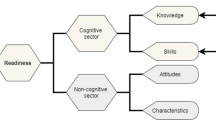Abstract
Focusing on entrepreneurial competency, the paper presents the research framework and results concerning the current training needs in Romania as the first stage for specific instructional design. Key entrepreneurial competencies leading to business success—(1) personal, including dominant entrepreneurial values, (2) social, and (3) practical/professional—were analyzed against typical competencies described by the literature. The study was conducted in four Romanian NUTS Regions (North-East, North-West, West, and Center), as part of a larger research project, CE@ANPART—Partnership for developing entrepreneurial capability and competitive human capital in Romania, aiming at developing a flexible web-based education and training needs assessment complex tool to be used at national level.
Access this chapter
Tax calculation will be finalised at checkout
Purchases are for personal use only
Similar content being viewed by others
References
McClelland D (1973) Testing for competence rather than ‘intelligence’. Am Psychol 28:1–14
Entrepreneurship in EU and beyond (2009) Flash Eurobarometer Series (283) http://ec.europa.eu/enterprise/policies/sme/facts-figures-analysis/eurobarometer/fl283_en.pdf
Bosma N, Jones K, Autio E, Levie J (2008) Global entrepreneurship monitor 2007 executive report. Babson College & London Business School, Babson Park, MA http://www.gemconsortium.org/
Bosma N, Levie J (2010) Global entrepreneurship monitor 2009 executive report. Babson College & London Business School, Babson Park, MA http://www.gemconsortium.org/
Yin RK (1989) Case study research: design and methods. SAGE, London
Lazear EP (2004) Balanced skills and entrepreneurship. American Economic Review, Papers and Proceedings, pp 208–211, May 2004
Mitchell RK, Busenitz L, Lant T, McDougall PP, Morse EA, Smith B (2002) Entrepreneurial cognition theory: rethinking the people side of entrepreneurship research. Entrep Theory Pract 27:93–104
Mitchell RK, Busenitz L, Bird B, Gaglio CM, McMullen JS, Morse EA, Smith JB (2007) The central question in entrepreneurial cognition research. Entrep Theory Pract 31:1–27
Gibb AA (1998) Entrepreneurial core capacities, competitiveness and management development in the 21st century. DUBS, Durham
Boyatzis RE, Goleman D, Rhee K (1999) Clustering competence in emotional intelligence: insights from the emotional competence inventory (ECI). In: Bar-On R, Parker JD (eds) Handbook of emotional intelligence. Jossey-Bass, San Francisco, pp 343–362
Garavan TN, McGuire D (2001) Competencies and workplace learning: some reflections on the rhetoric and the reality. J Workplace Learn 13(4):144–164
Gielen P, Hoeve A, Nieuwenhuis LFM (2003) Learning entrepreneurs. Eur Educ Res J 2:90–106
Zahra SA, Gedajlovic E, Neubaum DO, Shulman JM (2009) A typology of social entrepreneurs: motives, search processes and ethical challenges. J Bus Ventur 24(5):519–532
Timmons J, Spinelli S (2006) New venture creation: entrepreneurship for the 21st century, 7th edn. McGraw Hill International Edition, New York
Hutu CA, Avasilcai S (2009) Entrepreneurial capacity for sustainable development. Environ Eng Manag J 8(2):321–325
Avasilcai S, Hutu CA (2009) Case study: Florian Moldoveanu & PiLON Ltd (A). Rev Manag Econ Eng 8:197–206
Avasilcai S, Hutu CA (2010) Case study: Florian Moldoveanu & PiLON Ltd (B). Rev Manag Econ Eng 9:143–152
Hutu CA, Avasilcai S, Ivanov C, Teodoreanu I (2010) Assessing entrepreneurial capacity in Romania: research methodology and results on personal competencies. In: QMHE 2010 Proceedings, vol 2, pp 579–582
Hutu CA, Avasilcai S, Teodoreanu I, Ivanov C (2010) Education and training needs to develop entrepreneurial capacity in Romania: social and professional competencies. In: QMHE 2010 Proceedings, vol 2, pp 583–586
Avasilcai S, Hutu CA (2010) Romania: entrepreneurial values and sustainability. Environ Eng Manag J 9(7):983–993
Henry GT (1990) Practical sampling. SAGE, Newbury Park
Jaques E, Cason K (1994) Human capability: study of individual potential and its application. Gower, London
Boyatzis RE (1982) The competent manager: a model for effective performance. Wiley, New York
Gardelliano S (2002) Strengthening organizational core values and managerial capabilities. UNIDO Competencies, Vienna, AU: UNIDO-HR http://www.unido.org/fileadmin/media/documents/pdf/Employment/UNIDO-CompetencyModel-Part1.pdf
Fínez FJ (2008) Three steps methodology to measure an individual’s personal competences for entrepreneurship towards a “particular” business idea. Diagnosis methodology for the pair: entrepreneur competences—business idea. J Technol Manag Innov 3(1):99/107
Onstenk Jeroen (2003) Entrepreneurship and vocational education. Eur Educ Res J 2:74–89
McGrath RG, MacMillan I (2000) The entrepreneurial mindset. Harvard Business School Press, Boston
Rychen DS, Salganik LH, McLaughlin ME (2002) Definition and selection of competencies. Contributions to the second DeSeCo symposium, Geneva, Switzerland, February 2002. Swiss Federal Statistical Office, Neuchatel http://www.oecd.org/dataoecd/48/20/41529505.pdf
Spencer LM Jr, Spencer SM (1993) Competence at work: models for superior performance. Wiley, New York
Author information
Authors and Affiliations
Corresponding author
Editor information
Editors and Affiliations
Rights and permissions
Copyright information
© 2013 Springer Science+Business Media New York
About this paper
Cite this paper
Hutu, C.A., Avasilcai, S. (2013). Instructional Design for Building Entrepreneurial Competency in Romania: First Stage Research Framework and Results. In: Sobh, T., Elleithy, K. (eds) Emerging Trends in Computing, Informatics, Systems Sciences, and Engineering. Lecture Notes in Electrical Engineering, vol 151. Springer, New York, NY. https://doi.org/10.1007/978-1-4614-3558-7_43
Download citation
DOI: https://doi.org/10.1007/978-1-4614-3558-7_43
Published:
Publisher Name: Springer, New York, NY
Print ISBN: 978-1-4614-3557-0
Online ISBN: 978-1-4614-3558-7
eBook Packages: EngineeringEngineering (R0)




